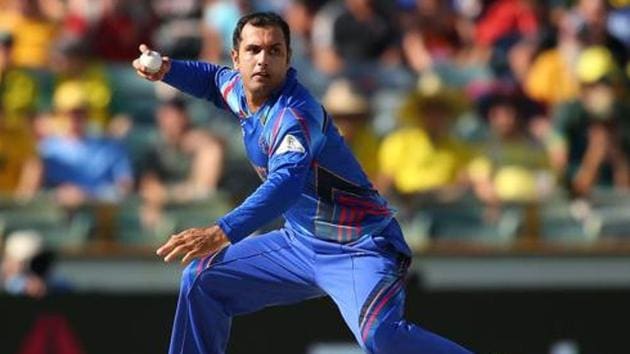World Cup 2019: Mohammad Nabi leads stinging Afghan spin attack
Afghanistan will go into the World Cup as a team to be wary of on the strength of its spin trio of Mohammad Nabi, Rashid Khan and 18-year-old Mujeeb Ur Rahman, who plays for Kings XI Punjab.
Back in 2003-04, when Mohammad Nabi first came to Hyderabad as a middle-order batsman for Afghanistan at the U-17 Asia Cup, few noticed him.

His team returned with just two wins, against UAE and Kuwait.
Fifteen years later on Thursday, Nabi sat on the dais in front of the media at the Feroz Shah Kotla, as the Hyderabad IPL team’s hero. He had scalped two of Delhi’s key batsmen, Shikhar Dhawan and Rishabh Pant, and along with compatriot Rashid Khan, who also picked two wickets, consigned the Capitals to a defeat at home.
“I don’t seek help from anyone,” says Nabi, highlighting the invaluable experience he now brings to any team. “I am 35, have played cricket for years. I learn on my own.”
Pace to Spin
He will need that confidence later this summer; Afghanistan will go into the World Cup as a team to be wary of on the strength of its spin trio of Nabi, Khan and 18-year-old Mujeeb Ur Rahman, who plays for Kings XI Punjab.
When Afghanistan rose to top level cricket towards the end of last decade, it was Shapoor Zadran’s long locks and left-arm swing bowling that caught the attention. It was natural to assume that Afghanistan, like neighbouring Pakistan, would live off a supply line of pace bowlers.
“Back then, we had fast bowling heroes like Hamid Hassan who initiated people into fast bowling,” says Bashir Stanikzai, the Afghanistan High Performance manager. “Now, Nabi, and youngsters like Rashid and Mujeeb are inspiring a generation to spin.”
Batsman to spinner
Nabi, the oldest of the three and the pioneer, began as a middle-order batsman who could bowl, and transformed himself into a specialist spinner.
He went from strength to strength and even ventured into trying the doosra during a camp ahead of the 2015 World Cup. “When he realised he couldn’t get it right, he stuck to the one that went straight on,” explains Bashir.
Against Delhi on Thursday, he was brought in by skipper Bhuvneshwar inside the Powerplay, because Nabi’s most valuable skill is his ability to clog the flow of runs. Delhi managed just 18 runs off Nabi from his three overs in powerplay, and he picked up a wicket in the bargain.
At a time when all the talk is about wrist spin and hunting for wickets without worrying about leaking runs, Nabi, a finger spinner, has changed the narrative, with Rashid: They stop runs.
“If you make him play more dot balls, the batsman will definitely make an error,” Nabi says. “If you chase wickets and you don’t get wickets, you end up giving runs because you also get hit.”
ALSO READ: IPL 2019, RCB vs KKR Turning Point: Andre Russell smacks 48 runs off 13 balls
Rashid’s role
It helps that Rashid is at the other end, not just for Afghanistan, but also at Sunrisers.
“Rashid is different from other leg-spinners. He is quick through the air, sharp, and his googly is not readable,” Nabi says. “Batsmen often try to remain on strike and make mistakes.” The Afghan spin trio have been travelling the world for T20 cricket and have a good experience of different conditions. They have played for different teams in the Big Bash (Australia) and NatWest T20 Blast (England).
“We play our natural cricket. We face different conditions, we absorb them,” said Nabi. “The main point is that you have to quickly adjust to conditions. Here, most of the pitches help turn, while in Australia, they bounce and go fast. That is why you focus on the line.”
With the World Cup in sight, Nabi says the preparations have already started.
“We played the NatWest T20 last year for this very purpose, to get used to the conditions,” Nabi says. “The strategy with Afghanistan is clear. Rashid and Mujeeb are wicket-taking bowlers. My idea is to bowl as many dot balls as possible. If I bowl dot balls, there’ll be pressure at the other end.”
Bashir Stanikzai feels the local T20 league has also taught the players how to withstand crowd pressure. “There are 10,000 people on weekends,” he says. “It creates plenty of pressure. We had cricket back in early 2000s (a provincial tournament) when Taliban were ruling, but only a handful watched as most people had gone out as refugees to Pakistan, Iran and Europe. Now things have changed.”






